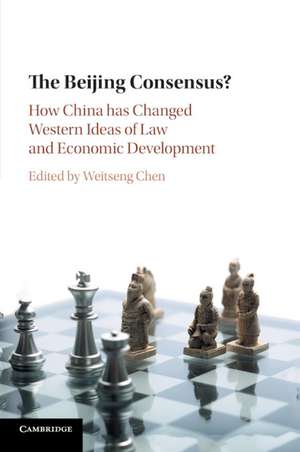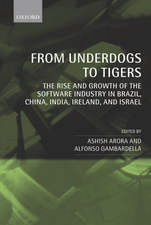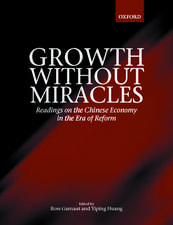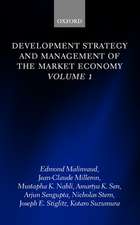The Beijing Consensus?: How China Has Changed Western Ideas of Law and Economic Development
Editat de Weitseng Chenen Limba Engleză Paperback – 19 dec 2018
| Toate formatele și edițiile | Preț | Express |
|---|---|---|
| Paperback (1) | 320.75 lei 6-8 săpt. | |
| Cambridge University Press – 19 dec 2018 | 320.75 lei 6-8 săpt. | |
| Hardback (1) | 745.86 lei 6-8 săpt. | |
| Cambridge University Press – 26 apr 2017 | 745.86 lei 6-8 săpt. |
Preț: 320.75 lei
Nou
Puncte Express: 481
Preț estimativ în valută:
61.37€ • 64.09$ • 50.68£
61.37€ • 64.09$ • 50.68£
Carte tipărită la comandă
Livrare economică 15-29 aprilie
Preluare comenzi: 021 569.72.76
Specificații
ISBN-13: 9781316503034
ISBN-10: 1316503038
Pagini: 365
Ilustrații: 6 b/w illus.
Dimensiuni: 150 x 230 x 20 mm
Greutate: 0.49 kg
Editura: Cambridge University Press
Colecția Cambridge University Press
Locul publicării:Cambridge, United Kingdom
ISBN-10: 1316503038
Pagini: 365
Ilustrații: 6 b/w illus.
Dimensiuni: 150 x 230 x 20 mm
Greutate: 0.49 kg
Editura: Cambridge University Press
Colecția Cambridge University Press
Locul publicării:Cambridge, United Kingdom
Cuprins
Introduction: debating the consensuses Weitseng Chen; Part I. Deconstructing the Beijing Consensus: 1. Dialogus de Beijing Michael W. Dowdle and Mariana Mota Prado; 2. Imagining China: Brazil, labor and the limits of an anti-model Jedidiah Kroncke; 3. The Beijing consensus and possible lessons from the 'Singapore Model'? Tan Cheng-Han; Part II. Examining the Beijing Consensus in Context: 4. The legal maladies of 'federalism, Chinese-style' Wei Cui; 5. Lessons from Chinese growth: re-thinking the role of property rights in development Frank K. Upham; 6. Size matters? Renminbi internationalization and the Beijing consensus Weitseng Chen; 7. A Chinese model for tax reforms in developing countries? Ji Li; 8. The Chinese model for securities law Yingmao Tang; Part III. Revisiting the Beijing Consensus: 9. Authoritarian justice in China: is there a 'Chinese Model'? Benjamin L. Liebman; 10. China's striking anti-corruption adventure: a political journey towards the rule of law? Hualing Fu; 11. Chinese corporate capitalism in comparative context Curtis J. Milhaupt.
Recenzii
'The relationship between law and development is a question that just will not go away. This volume assembles a top-notch group of scholars to examine what China's experience can tell us. While much of the previous work on this field has been done by economists, the contributors here are intimately familiar with the details of China's legal system and offer new and stimulating insights in this terrific collection of essays.' Donald Clarke, David Weaver Research Professor of Law, George Washington University Law School
'In this volume, a set of first-rate scholars turns their collective attention to dissecting a slogan and helps us to understand what we can - and cannot - conclude from China's experience of tremendous economic growth in recent decades. By presenting the real lessons of the Chinese developmental model, the book marks an important step forward for the law and development field.' Tom Ginsburg, Leo Spitz Professor of International Law, University of Chicago Law School
'This collection of essays on law and development in China is an especially timely contribution. China has recently emerged as the world's largest national economy in terms of its gross national product, although as the world's most populous nation, China ranks behind all of Europe, most of Latin America, and much of East Asia in terms of per capita income. The contributors include nine leading specialists of Chinese and comparative law from universities in Canada, China, Singapore, and the United States as well as two Brazilian scholars who add an especially cogent comparative perspective. They collectively question the applicability of the 'Washington Consensus' on the critical legal reforms necessary for sustained economic growth but differ in their varied perspectives on a 'Chinese Model' or a 'Beijing Consensus.' Provocative and insightful, [this book] is a must-read for those concerned with law reform and economic development.' John Haley, William R. Orthwein Distinguished Professor of Law Emeritus, Washington University School of Law
'The 'Beijing Consensus' has been a co-production of Left critics of the market-oriented Washington Consensus, Beijing's insecure authoritarian leadership, and pundits eager for a sound bite to capture China's complex political economy. The contributions to this volume do an excellent job of breaking down the 'Beijing Consensus' into concrete policy realms and helping us decide if there really is any there.' John Ohnesorge, George Young Bascom Professor of Law, University of Wisconsin Law School
'This excellent collection of essays shows that no clear 'Beijing Consensus' exists. Instead, the Chinese experience provides something even more interesting; its challenge to the 'Washington Consensus' invites reformers everywhere to engage in dialogue about the strengths and weaknesses of Chinese policies both for the future economic and political development of China itself and for reformers in other emerging economies.' Susan Rose-Ackerman, Henry R. Luce Professor of Jurisprudence, Yale Law School
'In this book, a distinguished international group of law and development scholars decomposes the idea of a Beijing Consensus by examining in detail the evolution of a number of areas of law in China, including tax law, property law, corporate law, securities law, and anticorruption law, with a view to addressing three key questions: How distinctive is the development trajectory of China's legal system in these areas as compared to other legal systems? What accounts for China's deviation from conventional models in these areas? If there is a distinctive general Chinese Model of development, or law and development, is this model replicable in other developing countries? In many important respects, the contributions to this book importantly advance debates about alternative development paradigms beyond unhelpful clichés or overgeneralizations through much more pragmatic evaluations of the relationship between law and development in particular social and political contexts.' Michael Trebilcock, Toronto University
'In this volume, a set of first-rate scholars turns their collective attention to dissecting a slogan and helps us to understand what we can - and cannot - conclude from China's experience of tremendous economic growth in recent decades. By presenting the real lessons of the Chinese developmental model, the book marks an important step forward for the law and development field.' Tom Ginsburg, Leo Spitz Professor of International Law, University of Chicago Law School
'This collection of essays on law and development in China is an especially timely contribution. China has recently emerged as the world's largest national economy in terms of its gross national product, although as the world's most populous nation, China ranks behind all of Europe, most of Latin America, and much of East Asia in terms of per capita income. The contributors include nine leading specialists of Chinese and comparative law from universities in Canada, China, Singapore, and the United States as well as two Brazilian scholars who add an especially cogent comparative perspective. They collectively question the applicability of the 'Washington Consensus' on the critical legal reforms necessary for sustained economic growth but differ in their varied perspectives on a 'Chinese Model' or a 'Beijing Consensus.' Provocative and insightful, [this book] is a must-read for those concerned with law reform and economic development.' John Haley, William R. Orthwein Distinguished Professor of Law Emeritus, Washington University School of Law
'The 'Beijing Consensus' has been a co-production of Left critics of the market-oriented Washington Consensus, Beijing's insecure authoritarian leadership, and pundits eager for a sound bite to capture China's complex political economy. The contributions to this volume do an excellent job of breaking down the 'Beijing Consensus' into concrete policy realms and helping us decide if there really is any there.' John Ohnesorge, George Young Bascom Professor of Law, University of Wisconsin Law School
'This excellent collection of essays shows that no clear 'Beijing Consensus' exists. Instead, the Chinese experience provides something even more interesting; its challenge to the 'Washington Consensus' invites reformers everywhere to engage in dialogue about the strengths and weaknesses of Chinese policies both for the future economic and political development of China itself and for reformers in other emerging economies.' Susan Rose-Ackerman, Henry R. Luce Professor of Jurisprudence, Yale Law School
'In this book, a distinguished international group of law and development scholars decomposes the idea of a Beijing Consensus by examining in detail the evolution of a number of areas of law in China, including tax law, property law, corporate law, securities law, and anticorruption law, with a view to addressing three key questions: How distinctive is the development trajectory of China's legal system in these areas as compared to other legal systems? What accounts for China's deviation from conventional models in these areas? If there is a distinctive general Chinese Model of development, or law and development, is this model replicable in other developing countries? In many important respects, the contributions to this book importantly advance debates about alternative development paradigms beyond unhelpful clichés or overgeneralizations through much more pragmatic evaluations of the relationship between law and development in particular social and political contexts.' Michael Trebilcock, Toronto University
Descriere
A collection of essays exploring whether a distinctive Chinese model for law and economic development exists.















